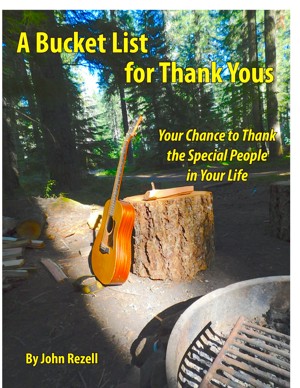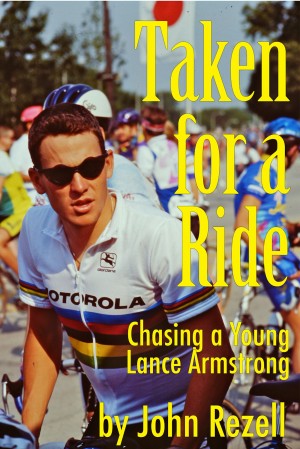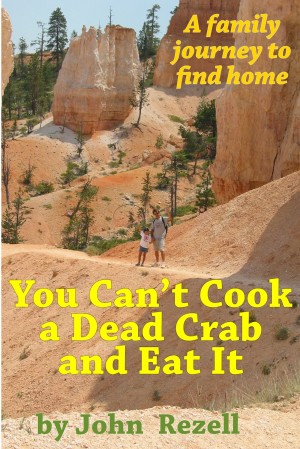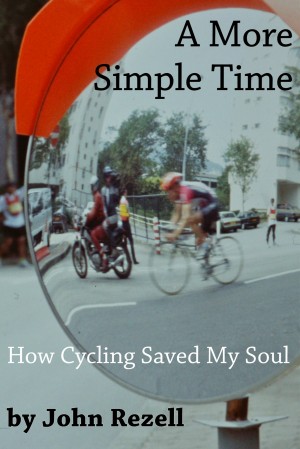Interview with J R
Published 2014-12-29.
Do you remember the first story you ever wrote?
My first story I remember writing was when I was in third grade. It was about a guy driving a car that loses control and crashes off a bridge into a river. It was all about fighting to get out of the car and everything running through his mind. Just as he is about to die, of course, he wakes up.
Thing was, at the time I was deathly afraid of driving over bridges. I'd literally hide on the floor of the backseat of our station wagon (back before seat belts) while my older brothers gave me a running commentary of what I was missing: "Oh, my gosh! This has to be the tallest bridge ever! Oh, NO! There's a big hole in the road!" Stuff like that. The worst was when they said we were over the bridge, and I'd get up and we'd be halfway over.
The worst was the bridge over the Mississippi River at Dubuque, Iowa. It had an actual angle/turn in the middle! So it looked as if you go straight you'd go right over the edge. Interestingly enough, my second job out of college was working for the newspaper in Dubuque, and I drove over that bridge with sweaty palms the first time, and never had a problem again.
The beauty of writing my first story was that my Dad realized I had an interest and a pinch of talent, so he began paying me a penny for every five words for anything I wrote. In sixth grade I started producing my own sports magazine, and left fiction behind.
What is your writing process?
Let it flow. This comes from years of working at newspapers when I'd rush back to the office after a night sporting event and have to hammer out a story in short order. Sometimes 10-15 minutes.
I've stressed to my daughters that your brain has figured out most of your story already, so don't get in the way. Let it flow. Besides, what makes good writing great is editing. So don't edit until you've got the flow out, since editing flow is the toughest.
Since the chances of a copy editor having any real time with a story were slim, I'd write the lead. Then read the lead and write the next blast. Then go back to the top and read through, then write. It helps with flow of the story, as well as tightening up the beginning.
Most important is to not stare at a blank screen. Just start writing and keep writing, even if you think it sucks. You can't edit in your head, you have to get it out.
What's the story behind your latest book?
I'm bringing three books to the market at the same time, since they are all memoirs and are tied together by a common thread.
The early drafts of all three were written years ago, and shelved for the right time. That is, for years I've been waiting for epublishing to arrive so I wouldn't have to deal with print publishers. They've come out now because my oldest daughter is a freshman in college, and it's time to find some extra income. Her sister is two years away from college.
They also sat because, frankly, writing is not just my profession, it's my life. I'm a writer. It's what I do. It's what I have to do. My satisfaction comes from the act of writing. It doesn't come from someone reading it. Or getting recognition.
The simple act of writing compares with every other fun and fulfilling element of my life. It can be like a great bike ride. Or a fantastic hike. Or playing my sax on stage. Or just hanging with my girls.
I'll write something and literally laugh my butt off. Or make myself cry. Or make myself talk to myself (which happens far more often than I'd like to admit). That's when I know I've done it right. If it moves me, well, that's all I'm looking for in life.
All three books are connected by my relationship to Lance Armstrong, whom I began covering in 1992. We became very close and I believed my first book would be Lance's biography. It didn't work out that way. But Lance and each and every cyclist I had the pleasure of covering had an impact on my life. They taught me countless lessons and inspired me in endless ways.
When I left the daily grind of sports journalism behind, I missed the overwhelming spirit of Carpe Diem. That drive to find a way to make yourself better, somehow, each day so that when a grand opportunity arrives you can capitalize on it.
My book "A More Simple Time: How Cycling Saved My Soul" had to be chopped with a machete, like trying to get through the rainforest. I could literally sit here and tell stories of 50 cyclists who impacted me whose names don't even appear in the book. That time of my life is so deep and rich, and I thank every one of those cyclists. I hope they never think for one moment that because they are not mentioned in the book that they are not remembered or appreciated.
My book "Taken for a Ride: Chasing a Young Lance Armstrong" is all about Lance. I pulled those stories from Simple Time so Lance would not overshadow the individuals in that story. My relationship with Lance had a life of its own. But it was, in the grand scheme, just a sliver of what covering cycling meant to me. Still, it's the one aspect of it that everyone asks about and wants to know about. So, thanks to my sister's constant encouragement, I finally wrote it and shared it.
My book "You Can't Cook a Dead Crab and Eat It" is the story of transferring all those lessons from all those cyclists to my daughters. The sum of it is simple: You make your life what you want it to be. If it isn't working out the way you want, change it. You have the power. We were living in Tennessee, not really fitting in, after chasing career opportunities most of our adult life. With my daughters ages 6 and 8 and coming to the age when they really understand things, we quit our jobs, sold our house and spent the next 85 days driving 8,000 miles touring the American West deciding where to live. It all started, it seemed, the day I heard Lance was retiring. So I blame him. Or, give him credit.
What do your fans mean to you?
As a journalist you don't think of fans, you think of readers. They are the individuals that you have an unwritten contract with that requires you to respect the responsibility that comes with being a journalist. Readers expect you to be honest, fair and objective. I go into this in my books. I do believe that true journalists are born that way. True journalists have the ability to really be objective, and not take sides. It's something that most people don't really understand, nor necessarily believe exists. But it does.
I suppose a definition of a fan would be anyone who actually decides to read something in large part because it has my byline on it. Having been out of the game for a while, I'm not sure how many people will remember my name. If there are fans out there, well, the mere thought is really quite humbling and something I haven't considered until I saw this question.
What are you working on next?
When I arrived in Oregon and landed a part-time job as a sports copy editor for the local newspaper (that allowed me to work nights 8-midnight and still be a daytime stay-at-home Dad), I pitched the idea of an outdoors column. The premise was that I was new to Oregon, and I wanted the locals to show me their favorite elements of this amazing state.
It morphed more into a parental column as so many of those adventures were shared with my wife and daughters. To hike to the top of a mountain and have lunch, or to a mountain lake and plunge into the icy waters together have given us moments that are unforgettable. I want to share those moments with everyone, and encourage parents to get kids outside. The natural world is amazing.
The book of those outdoor adventures will focus on Oregon first, and later our wonderful times at National Parks. I hope it will spark a lot of dreaming and give people ideas of where to go.
Who are your favorite authors?
Although he lives right here in Eugene (at least I'm pretty certain) and we've never met, I really think that Kenny Moore had as big an influence on me as anyone. He was a runner who also wrote for Sports Illustrated, and told the world the story of Steve Prefontaine. Pre was one of my idols growing up. I've always tried to write about sports in a way that inspires kids to dream and teaches lessons on how to overcome hardships and challenges.
Bill Murray's columns for the LA Times are gold.
They stand out above the rest. There are a lot of great writers out there.
What inspires you to get out of bed each day?
The wonder of life. I simply can't wait to see what each day will offer.
When you're not writing, how do you spend your time?
We spend a lot of time outdoors. We camp as a family. We hike as a family.
Since we have always lived far from family and seldom have the opportunity to travel for Holidays, we go hiking on Christmas and Thanksgiving. Getting out into the woods and letting our black lab Ridgely run around is a joy.
Describe your desk
My dreams to become a writer began by sitting at this huge, ornate wooden desk that my sister left behind when she got married (that's a blog entry on my website). At home I haven't had a desk for 20 years. I had a folding table in my own room in Tennessee. But now it's just my laptop on the kitchen table. Simple.
Where did you grow up, and how did this influence your writing?
I grew up in Wisconsin, in a suburb of Milwaukee. After college, I moved from Wisconsin and haven't been back much since. However, that has nothing to do with Wisconsin. I think it's a great place to have grown up. People there are real, not fake. They are sincere and friendly. The state itself is amazing, and that's where my love of nature began.
Physically I consider Oregon to be Wisconsin on steroids. Instead of hills we have mountains. Instead of streams we have rivers. Instead of Lake Michigan we have the Pacific Ocean. But overall, it's all about being lush and green.
Smashwords Interviews are created by the profiled author or publisher.
Books by This Author
A Bucket List for Thank Yous: Your Chance to Thank the Special People in Your Life
by J R
A Bucket List for Thank Yous is a compilation of Thank You letters I've written to the people who have had the biggest influence on my life. This book is for everyone who finds it difficult to put the words together to thank those who have left an imprint on their life. My hope is that you find inspiration to thank those individuals, and send them a copy of this book.
Taken for a Ride: Chasing a Young Lance Armstrong
by J R
I met Lance Armstrong in 1992 and began a journalist-athlete relationship that lasted, roller-coaster style, for eight years. This is the story of the young Lance, before he became world famous, and later, infamous. Lance influenced a lot of people. He changed a lot of lives. Some for good. Some not for good. I only know that he changed mine for the better. I can’t change that. I wouldn’t want to.
You Can't Cook a Dead Crab and Eat It
by J R
Imagine spending 85 days living in a popup tent camper while driving 8,000 miles around the American West in search of a place to call home. We didn't imagine it. We lived it. This is the story of that journey. An unforgettable time when we taught our daughters an important lesson: When your life isn't going the way you envisioned, take control and make your life what you want it to be.
A More Simple Time: How Cycling Saved My Soul
by J R
By twist of fate cycling became more than a hobby. It became my beat. As America's top journalist covering US cycling (1989-96), I watched the rise of extraordinary athletes from Linda Brenneman, Alison Dunlap and Dede Demet to Steve Hegg, Bobby Julich and Kent Bostick. They shared their quests, one pedal stroke at a time. It's a ride to the Atlanta Olympics that changed my life and saved my soul.




